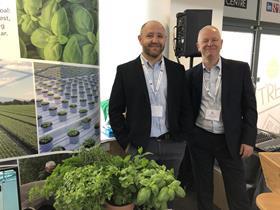
There is no major shortage of skilled young people joining the fresh produce industry, but more could be done to attract the best young talent as technological advances create new job opportunities in the sector.
That was the message from exhibitors at The Fresh Careers Fair in London yesterday (13 March), who spoke of the need to make graduates and other candidates aware of the wide range of career opportunities in the fresh produce sector.
“The horticulture and agriculture industries haven’t been the sexiest for the past 10-15 years and employees have been aging but companies are making a few changes now,” said Vitacress’ head of horticulture John Benfield.
“We’re going through quite an exciting time with automation, robotics, AI, big data and sensors. AI and big data are a bit beyond me at the moment but getting people into your business who can make the most of these new opportunities and take the right decisions will be key going forward.”
Also exhibiting at the event for the fresh produce, food retail, foodservice and hospitality sectors, recipe box scheme Hello Fresh stressed that it needs people who know how to analyse and use data.
“Companies like ours – that use a lot of data to make decisions – need people, not just in data roles but in all roles, to be able to analyse and use data.
“If any applicant for any role at Hello Fresh could show they’d used Tableau or Microsoft Sequel to analyse some data, that’d be a big plus.”
To attract this kind of talent, fresh produce firms need to make young graduates aware not only of the more technical roles that are available, but also of their companies’ very existence.
Events like The Fresh Careers Show, which attracted around 1,000 visitors and 35 exhibitors, are not only an important way of not only linking students and employers, but also of letting people know what fresh produce companies do.
“As a company, we’re very well known in the industry but outside of it nobody knows who we are because it’s all own label in the supermarkets,” said Berry Gardens’ head of HR Samantha Desforges.
“Some people think the fresh produce industry’s just about working in a packhouse, but they don’t realise the technical side, the development side. At Berry Gardens we’re heavily involved in R&D and we sponsor quite a few PhD students at the University of Lincoln and the University of Reading.
“People also don’t realise that we sponsor robotics and lots of graduates are keen to get into that.”
One area where the business is experiencing worker shortages is agronomy, with Desforges bemoaning the fact that universities and colleges have cut agronomy courses in recent years.
“The jobs we struggle to recruit for are on the agronomy side,” she said. “There’s a big shortage of senior agronomists. It’s such a small, niche market and you tend to know all the them.”
Another area of the trade that has struggled to attract new recruits for some time now is wholesale, with young people increasingly put off by the unsociable hours and long working weeks.
“We definitely struggle to recruit enough young people in our wholesale division,” said Total Produce HR manager Gary Jamieson. “You often have to work six days a week and you might have to start at 1am or 2am in the morning. Nowadays people don’t really want to do that.
“We’ve had more luck recruiting graduates in finance, marketing and HR, for example, but we really struggle on the operations side – there’s a gap.”
It can also be difficult to attract graduates due to competition from other sectors, he added. “The banks and some of the other big companies outside fresh produce are offering higher starting salaries and really good packages so most students look to them first,” he explained.
“When most students are at uni I don’t think they really consider the fresh produce industry unless they’re doing a food science degree or something like that.”
Despite these challenges, Melissa Bowcock, senior HR business partner at BerryWorld, said there’s no shortage of young people coming into the business.
“We’re seeing some really good talent coming through our graduate programmes and working in our office,” she reported.
“We’re not struggling, we’re still finding lots of brilliant young people. We’re more concerned for our growers and their workforce but we know that everyone’s going to be in the same boat. “
Reflecting on the labour challenges facing growers, which have been intensified by Brexit, Fresca chairman Chris Mack said the cost and availability of labour will continue to drive more interest and investment in robotics.
This has boosted demand for robotics and Mack said he’s now seeing “almost a shortage” of resource at robotics suppliers “because suddenly everybody’s interested.”



